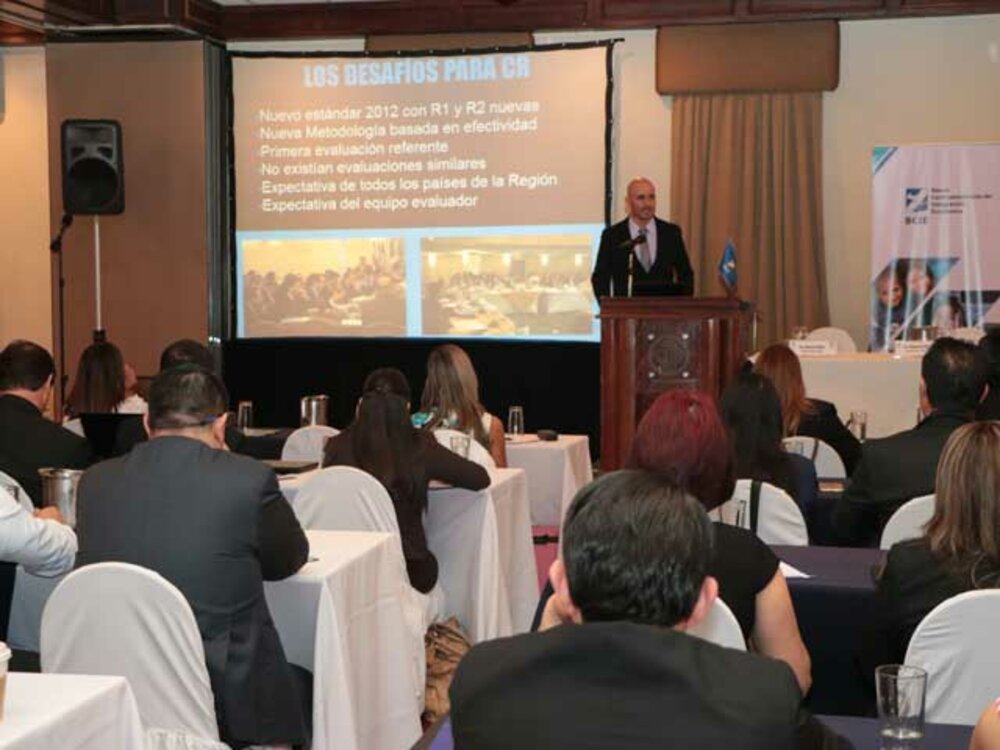Costa Rica strengthens to face money laundering and terrorism financing

Cabei reinforces financial systemin the face of organized crime.
San José, August 11, 2017 (AFP SERVICES/CABEI). On the one hand, the mafias that control money laundering and terrorism financing are always seeking new ways to achieve their purposes. On the other hand, on a daily basis authorities try to unravel the mechanisms used by organized crime to mobilize their resources.
It is a never-ending game, but as representatives of the Central American Bank for Economic Integration (CABEI) state, it is necessary to promote a culture for countries and their inhabitants to join in the efforts to end these scourges.
In that line, CABEI, in coordination with the Costa Rican Institute on Drugs (ICD), closed ranks with the Costa Rican authorities to analyze the challenges and learn about the latest progress regarding risk of money laundering and terrorism financing.
On August 10 and 11, representatives from the Public Ministry, the Judicial Investigation Organization, ICD and local financial institutions' compliance officers participated in the "Third Seminar on the Latest Advances in the Fight against Money Laundering and the Workshop on Money Laundering and Terrorism Financing Matrices."
CABEI, which the region's multilateral development bank, believes that the growing activity of money laundering and trafficking linked to terrorism forces it to strengthen systems and policies to combat these scourges.
CABEI Director for Costa Rica Dr. Alberto Cortés stated that, "The Bank's concern is that such illicit activities have an impact on the legitimacy of not only the political system and democracy, but also on the development of our societies. We have to make every effort to ensure that the different sectors have an attitude of permanent preventive vigilance in the fight against these scourges."
The event included a presentation from Guatemalan Ricardo Vélez Lara, who is an international auditor, consultant and trainer for more than 100 entities and financial groups in several countries of the region.
Mr. Velez explained that, "We are working with CABEI on a project to train and implement the ISO standard (31000). The idea is to help the financial system strengthen its implementation strategies. Costa Rica is a part of the region that is vulnerable to drugs, dirty money and corruption. It is noteworthy that not only Costa Rica has been under evaluation, but the entire region in order to streamline all implementation strategies."
CABEI Integrity and Compliance Official, Mr. Nestor Chavez, highlighted Costa Rica's efforts to prevent money laundering and terrorism financing with such examples as the new anti-terrorism law, efforts in the field of professional non-banking activities (which includes accountants and auditors as subjects called to report when they detect suspicious movements; an activity formerly exercised by banks), as well as improvements related to the final beneficiary (focus attention on the last person that receives the resources).
Mr. Chavez added that, "CABEI seeks to prevent this type of crime by professionalizing the individuals who are part of the Costa Rican financial system in order to strengthen their knowledge in the specific subject of risk management of money laundering and terrorism financing. If the people working in the chain of crime prevention, mitigation and repression are better prepared, they can respond more efficiently."
Likewise, CABEI Country Manager for Costa Rica, Mr. Mauricio Chacón, recalled that the authorities of the region face a "very sophisticated" counterpart. "We must continue the analysis and search for the best experiences in other countries that have units that are constantly reviewing these situations in order to achieve that, in the same way that these groups are organized and seek to be more sophisticated, the organizations that fight against them can also be more effective and streamlined.”









